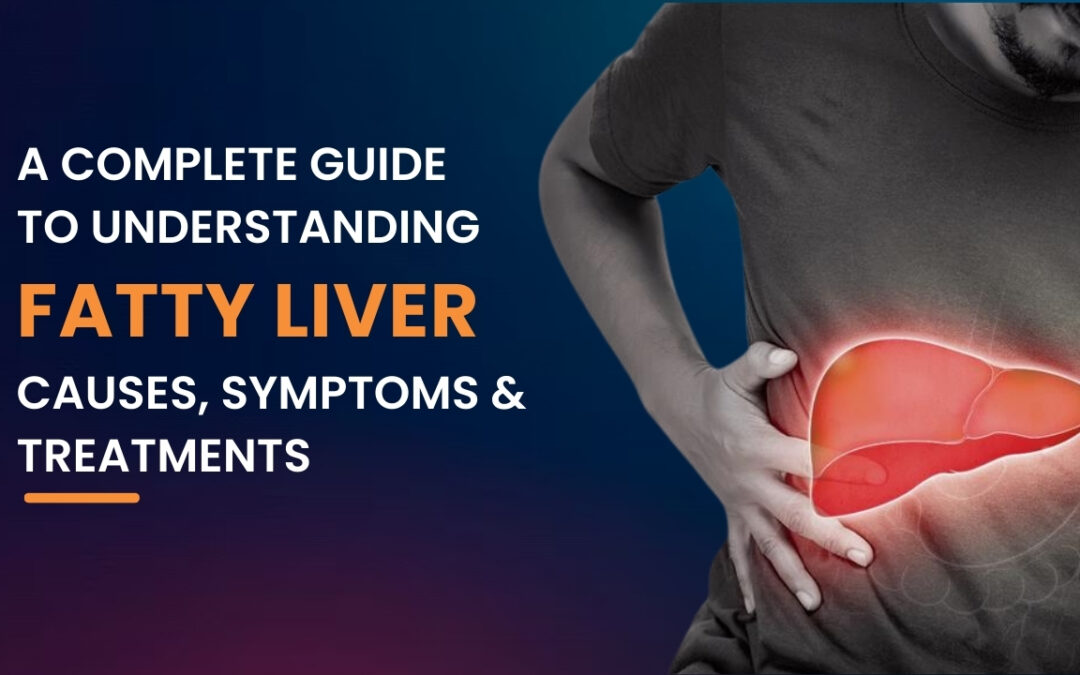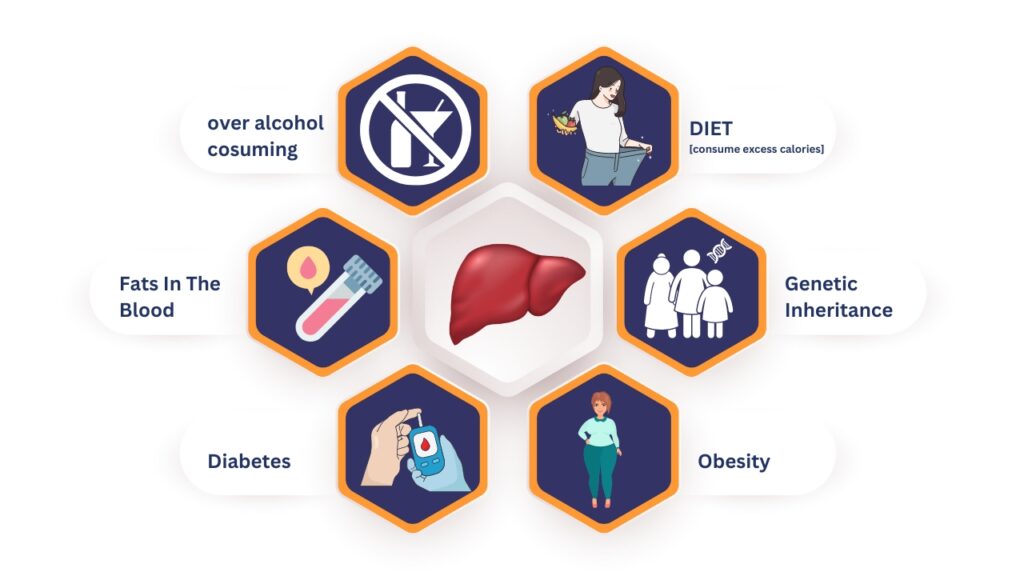Introduction Of Fatty liver
Fatty liver is a common condition with various causes and symptoms that can impact on liver and whole health. There are various types of fatty liver also known as Non-Alcoholic Fatty Liver Disease (NAFLD) and Alcoholic Related Liver Disease (ARLD). The condition of Fatty liver is where too much fat builds up in the liver cells. it’s especially common in people who are overweight or obese and have diabetes. It’s a common liver complaint in Western countries, affecting about one in every 10 people.
Prevalence Of Fatty Liver
Fatty liver has become increasingly common in recent years, affecting about 25% of the global population. The rise is mainly attributed to unhealthy diets, sedentary lifestyles, and obesity. Fatty liver, also known as hepatic steatosis, occurs when excess fat accumulates in the liver cells. This can interfere with the liver’s normal functioning and lead to various health issues. Sudden changes in our daily activities lead to fatty liver diseases.
Importance of Understanding Fatty Liver
Knowing about fatty liver is very important nowadays it will help you reduce the risk of getting fatty liver diseases. whenever we don’t identify and neglect liver issues it can progress to more severe conditions like liver cirrhosis or liver cancer if left untreated. Also, it will damage the whole health. Knowledge empowers individuals to make informed decisions about their health.
Causes Of Fatty Liver
There are two main types of fatty liver disease: Non-Alcoholic Fatty Liver Disease (NAFLD) and Alcohol Related Fatty Liver Disease (AFLD), each with distinct causes and risk factors. They both have different conditions mainly depending on lifestyle and diet.
Non-Alcoholic Fatty Liver Disease (NAFLD)
Non-alcoholic fatty Liver Diseases (NAFLD) are mostly linked with very common problems most people suffer from nowadays these are some reasons like.
● Obesity
● Diabetes
● High cholesterol
● metabolic syndrome.
these are more common reasons for getting Non-alcoholic fatty Liver Diseases (NAFLD) fatty liver diseases and often manifest in individuals who consume excess calories or have a sedentary lifestyle.
Alcohol-Related Fatty Liver Disease (AFLD)
As the name suggests, Alcohol-Related Fatty Liver Disease( AFLD ) is caused by excess alcohol consumption. The liver metabolizes alcohol into toxic substances, damaging liver cells and leading to fatty liver. Sometimes it leads to untreated situations
Other Risk Factors for Fatty Liver
● Genetics
● Rapid weight loss
● Medications
● Insulin resistance (certain medical conditions like insulin resistance can also contribute to the development of fatty liver.
these are more common reasons for getting Alcohol-Related Fatty Liver Disease( AFLD ) fatty liver diseases and often manifest in individuals who consume excess calories or have a sedentary lifestyle.
Symptoms of Fatty Liver
Fatty liver can present differently in individuals, ranging from being asymptomatic to causing severe symptoms depending on the extent of fat accumulation in the liver.
Asymptomatic Fatty Liver
Fatty liver disease is often asymptomatic, especially in its early stages. In many cases, fatty liver does not cause noticeable symptoms and is often discovered incidentally during routine medical examinations. in that case, we only identify whenever we test our body like blood tests and other medical procedures.
Mild Symptoms of Fatty Liver
Fatigue, abdominal discomfort, and mild liver inflammation are common symptoms associated with fatty liver.
- Fatigue ( Feeling tired or generally unwell)
- Weight loss (Unexplained weight loss)
- Weakness (Muscle weakness)
- Abdominal discomfort ( A dull or aching pain in the upper right side of the abdomen, or just below the rib cage where the liver is located. The pain may worsen after eating)
Severe Symptoms of Fatty Liver
As fatty liver progresses, it can lead to more severe symptoms like jaundice, swelling of the abdomen, and liver scarring.
● Jaundice: Yellowing of the skin and whites of the eyes
● Swelling: In the legs, ankles, feet, or tummy
● Itchy skin: Long-lasting itching
● Spiderlike blood vessels: On the skin
● Fluid retention: Internal bleeding, muscle wasting, and confusion
Treatments
Diagnosis and Treatment of Fatty Liver
Early detection of fatty liver is crucial for effective management and prevention of complications. Manually we dont find exact problem so there are Various diagnostic tests and treatment options are available on hospitals like Wellness Hospital.
Diagnostic Tests for Fatty Liver
Blood tests, imaging tests like ultrasound and MRI, and liver biopsy can help diagnose and assess the severity of fatty liver disease.
Medical Treatments for Fatty Liver
In cases where lifestyle modifications are not sufficient, healthcare providers may recommend medications or other interventions to treat fatty liver disease. Book For Doctor Appointment Now for best gastroenterology specialist at wellness Hospital.
Conclusion
Understanding the fatty liver causes, symptoms, and treatment options for fatty liver is paramount for maintaining liver health and overall well-being. Early detection and proactive management can help prevent the progression of fatty liver to more serious liver conditions.
FAQs:
- Can fatty liver be reversed?
Yes, fatty liver can be reversed through Medical consultation and some medications.
2.Are there any long-term complications associated with fatty liver?
If left untreated, fatty liver can lead to liver cirrhosis, liver cancer, or liver failure.
3.How can I prevent fatty liver in the first place?
Maintaining a healthy weight, eating a balanced diet, limiting alcohol consumption, and staying physically active can help prevent fatty liver.
Remember, your liver is a vital organ that plays a crucial role in keeping your body functioning optimally. Take care of it, and it will take care of you.



